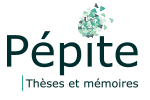Le trouble spécifique du langage écrit sans trouble de la compréhension orale chez l’étudiant : état des lieux des pratiques professionnelles orthophoniques
- Trouble spécifique du langage écrit ; dyslexie chez l’adulte ; étudiant post-bac
- Specific written language disorder ; adult dyslexia ; post-bac student
- Langue : Français
- Identifiant : ULIL_SMOR_2025_083
- Faculté/Ecole : Médecine
- Date de soutenance : 13/06/2025
- Type de mémoire : Mémoire de Master
- Discipline : Mémoire d'Orthophonie
Résumé
Le Trouble Spécifique du Langage Ecrit (TSLE), incluant la dyslexie et la dysorthographie, est un trouble neurodéveloppemental chronique à l’origine de difficultés en lecture et en expression écrite. Persistant à l’âge adulte, il peut constituer un obstacle à la réussite académique, notamment dans l’enseignement supérieur. Les étudiants concernés sont confrontés à de nombreux défis, et ce sujet demeure encore peu exploré dans la littérature scientifique. Ce mémoire explore les pratiques actuelles des orthophonistes dans l’accompagnement des étudiants de l’enseignement supérieur présentant un TSLE, en mettant l'accent sur l'évaluation orthophonique, les outils diagnostiques et le type de traitement orthophonique proposé. L'objectif est de mieux comprendre les approches professionnelles existantes afin d’identifier les possibilités d’amélioration du soutien apporté à ces étudiants. Pour ce faire, nous avons diffusé un questionnaire informatisé à tous les orthophonistes exerçant ou ayant exercé en France, en métropole ou en outre-mer. Cent orthophonistes répondant aux critères d'inclusion ont participé à l’enquête. Parmi eux, 90 % déclarent avoir reçu entre 1 et 20 étudiants en bilan de langage écrit, et 41 % indiquent rencontrer des difficultés dans le choix des épreuves à utiliser. Seuls 31 % estiment avoir des connaissances théoriques suffisantes concernant la prise en soin de ces étudiants. Ainsi, 88 % se disent intéressés par une formation spécifique sur le TSLE chez l’étudiant. Nos résultats montrent la pertinence de poursuivre les recherches expérimentales concernant l’évaluation et la prise en soin de ces étudiants afin de créer des protocoles concrets à mettre en place en séances d’orthophonie.
Résumé traduit
Specific Written Language Disorder, including dyslexia and dysorthographia, is a chronic neurodevelopmental disorder that causes difficulties in reading and written expression. Persisting into adulthood, it can be an obstacle to academic success, particularly in higher education. The students concerned face many challenges, and the subject remains little explored in the scientific literature. This dissertation explores the current practice of speech and language therapists in supporting students with Specific Written Language Disorder in higher education, focusing on speech and language assessment, diagnostic tools and the type of speech and language therapy offered. The aim is to gain a better understanding of existing professional approaches in order to identify opportunities for improving the support provided to these students. To this end, we sent out a computerised questionnaire to all speech and language therapists who practise or have practised in France, both in mainland France and overseas. One hundred speech and language therapists meeting the inclusion criteria took part in the survey. Of these, 90% said that they had received between 1 and 20 students for written language assessments, and 41% said that they encountered difficulties in choosing which tests to use. Only 31% felt they had sufficient theoretical knowledge of how to care for these students. As a result, 88% said they would be interested in specific training on Specific Written Language Disorder in students. Our results demonstrate the relevance of continuing experimental research into the assessment and care of these students in order to create concrete protocols for use in speech therapy sessions.
AUTEUR
- El Kachouti, Nora


